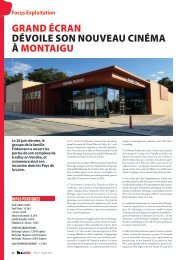Create successful ePaper yourself
Turn your PDF publications into a flip-book with our unique Google optimized e-Paper software.
7i/ci4Aut^to*t<br />
^cfront<br />
By LEE GARLING<br />
nraE FILM INDUSTRY was named defendant<br />
this week in a civil antitrust suit<br />
filed in the Court for the Southern District<br />
of New York as an outgrowth of the congressional<br />
inquiry into Communist infiltration<br />
in Hollywood and the suspensions of ten<br />
writers and directors which resulted.<br />
President Sheridan Gibney of the Screen<br />
Writers' Guild and 19 members brought the<br />
action jointly with ten members of the council<br />
of the Authors League of America, Inc.<br />
Attorneys are Thurman Arnold of Arnold,<br />
Fortas & Porter, Washington, and James T.<br />
Bredin of Monahan, Goldberg & Bredin, New<br />
York.<br />
The congressional inquiry last autumn,<br />
which led to contempt of Congress proceedings<br />
against ten Hollywood writers and<br />
directors on charges they refused to say if<br />
they are members of the Commimist party,<br />
also prompted a discharge resolution Nov.<br />
25, 1947, from the Motion Picture Ass'n of<br />
America and major producers, which declared<br />
the ten would be suspended unless<br />
they declared under oath they were not<br />
Communists.<br />
The resolution also set out:<br />
"We will not knowingly employ a Communist<br />
or a member of any party or group<br />
which advocates the overthi-ow of the government<br />
of the U.S. by force or by any illegal<br />
or unconstitutional methods."<br />
The resolution is the target of attack in<br />
the suit. The writers term it the result of<br />
an illegal combination or conspiracy, which<br />
violates the Sherman antitrust act, the Clayton<br />
antitrust act or the civil rights act, or<br />
all of them.<br />
It is not legal to fire persons because of<br />
their personal opinions, the brief insisted.<br />
The suit asks no damages, but an injunction<br />
? gainst the "combination and conspiracy of<br />
the defendants."<br />
THE FULL LIST OF DEFENDANTS: The<br />
Motion Picture Ass'n of America, its president,<br />
Eric Johnston, the Ass'n of Motion<br />
Picture Producers, the Society of Independent<br />
Motion Picture Producers, and seven<br />
film companies, as follows; Paramount,<br />
Loew's, RKO. Warner Bros., 20th Century-<br />
Fox, Columbia and Universal.<br />
The names of the plaintiff-writers are<br />
listed in nine pages, along with the major<br />
creative productions of each. The names include<br />
the following members of the board<br />
of directors of the SWG, in addition to Gibney:<br />
Robert Ardrey, Art Arthur, Claude Binyon,<br />
Charles Brackett, Frank Cavett, 'Valentine<br />
Davies, Richard English, Everett Freeman,<br />
Paul Gangelin, Albert Hackett, F. Hugh<br />
Herbert, Milton Krims, Arthur Kober, Ernest<br />
Pascal, George Seaton, Arthur Sheekman,<br />
Leonard Spigelgass, Dwight Taylor and Harry<br />
Tugend.<br />
Council members among those bringing the<br />
action are: Oscar Hammerstein II, John Hersey,<br />
Russel Grouse, Moss Hart, Christopher<br />
La Farge, Howard Lindsay. Richard Rodgers,<br />
Rex Stout, John 'Vandercrook and Glenway<br />
Wescott.<br />
To narrow the issues, the brief sets out<br />
that "all of the plaintiffs in this action publicly<br />
allege that they are not now and never<br />
have been members of the Communist party.<br />
They do not, in this proceeding, seek to raise<br />
constitutional questions as to the right of<br />
Congress to inquire as to their political affiliations."<br />
ACCORDING TO THE COMPLAINT, the<br />
November resolution goes further than the<br />
MPAA office. That is bad enough, it contends,<br />
for "through this combination of producers,"<br />
the result has been "to impose<br />
strangling limitations upon the treatment<br />
of serious subjects which are today freely<br />
presented in our best novels and our best<br />
stage plays."<br />
However, the MPAA office censors only the<br />
product, the document continues, while the<br />
November action goes to "the opinions and<br />
associations of the writers themselves."<br />
As for the November meeting, the complaint<br />
states:<br />
"The meeting was directly inspired and<br />
occasioned by the desire of the defendants<br />
to appease state and federal legislative committees<br />
which at the time were giving wide<br />
publicity to what they labeled un-American<br />
activities and Communist infiltration into<br />
the motion picture industry . . . Defendants<br />
feared loss of profits unless they could avoid<br />
unfavorable publicity from any source, however<br />
The aim<br />
intolerant or hysterical . . . and purpose of the conspiracy was and continues<br />
to be to form a combination of all<br />
the producers in the industry to the end that<br />
by joint action the entire industry can immediately<br />
respond to and appease any wave<br />
of hysteria directed at the screen, by offering<br />
to blacklist screen writers and other employes<br />
who happen to be temporary victims<br />
of that hysteria."<br />
* * *<br />
A MEASURE OF NEW construction<br />
came<br />
this week from the Department of Commerce<br />
in its first report since theatre building<br />
was freed of government controls. It estimated<br />
$12,000,000 worth of new recreational<br />
construction activity under way in March of<br />
this year, and $13,000,000 in April. This is<br />
roughly twice the volume of such construction<br />
under way a year ago.<br />
The figures apply to bowling alleys and<br />
the like as well as theatres, but cinemas make<br />
up about half the total in dollar volume.<br />
Commerce officials explain.<br />
The figures for the first four months of<br />
this year for recreational projects come to<br />
$47,000,000, nearly twice the figm-e for the<br />
corresponding period in 1947 of $25,000,000.<br />
As Congress prepared to remove controls<br />
over theatre building at the end of March, it<br />
was told that a total of $50,000,000 would be<br />
spent at once for the construction of new<br />
theatres, and additional sums for remodeling.<br />
Apparently, the full impact of the building<br />
program is yet to be felt.<br />
* * *<br />
IN ANOTHER REPORT the Department of<br />
Commerce said that by the end of 1947 the<br />
number of companies operating theatres has<br />
climbed to 14.300, a net increase of 900 over<br />
the total for 1946. 'While the number of firms<br />
rose each year since 1944 when it was 12,300<br />
at the end of the year, there was a casualty<br />
rate as well. The officials said this was 300<br />
for 1945, 400 for 1946 and 400 last year.

















